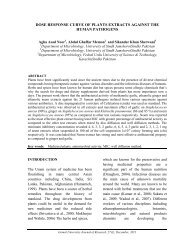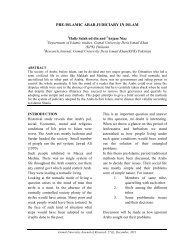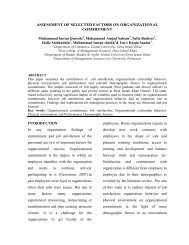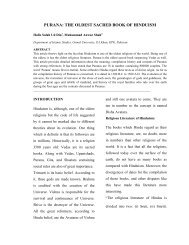a passage to india: the colonial discourse and ... - Gomal University
a passage to india: the colonial discourse and ... - Gomal University
a passage to india: the colonial discourse and ... - Gomal University
You also want an ePaper? Increase the reach of your titles
YUMPU automatically turns print PDFs into web optimized ePapers that Google loves.
46 Jajja, A Passage <strong>to</strong> India<br />
Mrs. Moor is portrayed as a kind, God<br />
fearing Christian, who is meant <strong>to</strong> be<br />
extremely sympa<strong>the</strong>tic <strong>to</strong>wards <strong>the</strong><br />
Indians <strong>and</strong> is very unhappy at <strong>the</strong> cruel<br />
treatment of <strong>the</strong> Indians by <strong>the</strong> Raj <strong>and</strong><br />
its functionaries. She reminds her son<br />
Ronny that as Christians, <strong>the</strong>y are duty<br />
bound <strong>to</strong> love Indians as well. Fielding,<br />
<strong>the</strong> principal of Government College, is<br />
presented as <strong>the</strong> new face of empire. He<br />
is not satisfied with <strong>the</strong> cosmic changes<br />
brought about by a few transfers <strong>and</strong><br />
postings. It is for Kincaid(1988) <strong>to</strong><br />
reveal <strong>the</strong> true reality of <strong>the</strong> British love<br />
for knowledge, <strong>and</strong> <strong>the</strong>ir enthusiasm <strong>to</strong><br />
impart <strong>the</strong> same <strong>to</strong> <strong>the</strong> natives. Raj can<br />
continue only if its officials are<br />
compassionate <strong>and</strong> genuinely friendly<br />
<strong>to</strong>wards <strong>the</strong> Indians. In <strong>the</strong> changing<br />
circumstances, <strong>the</strong> nineteenth century<br />
attitude <strong>and</strong> mode of administration<br />
cannot continue, “Ah, that won’t take us<br />
far. Indians know whe<strong>the</strong>r <strong>the</strong>y are liked<br />
or not—<strong>the</strong>y cannot be fooled here.<br />
Justice never satisfies <strong>the</strong>m, <strong>and</strong> that is<br />
why <strong>the</strong> British Empire rests on s<strong>and</strong>”.<br />
The Lieutenant-Governor Sir Gilbert<br />
also belongs <strong>to</strong> <strong>the</strong> new school of<br />
thought, regarding <strong>the</strong> administration of<br />
<strong>the</strong> colonies. Forster is not an opponent<br />
of empire, he only knows like Sir Gilbert<br />
that <strong>the</strong> h<strong>and</strong>s of <strong>the</strong> clock move forward<br />
<strong>and</strong> not back. In a sense Forster intends<br />
<strong>to</strong> disarm <strong>the</strong> possible nationalistic<br />
uprising against <strong>the</strong> colonizers. The<br />
British need <strong>to</strong> come up with a solid new<br />
strategy <strong>to</strong> maintain <strong>the</strong>ir hold over<br />
India. Fielding believes, “we all build<br />
upon s<strong>and</strong>; <strong>and</strong> <strong>the</strong> more modern <strong>the</strong><br />
country gets, <strong>the</strong> worse will be <strong>the</strong><br />
crash”. Forster through Fielding makes<br />
his new philosophy crystal clear. “In <strong>the</strong><br />
old eighteenth century, when cruelty <strong>and</strong><br />
injustice raged, an invisible power<br />
repaired <strong>the</strong>ir ravages. Every thing<br />
echoes now; <strong>the</strong>re is no s<strong>to</strong>pping <strong>the</strong><br />
echo. The original sound may be<br />
harmless, but <strong>the</strong> echo is always evil”.<br />
Portrayal of <strong>the</strong> Growth of <strong>the</strong> Indian<br />
identity:<br />
Though, India is shown slowly <strong>and</strong><br />
gradually moving <strong>to</strong>wards its roots <strong>and</strong><br />
identity, but it has not resulted in <strong>the</strong><br />
development of national identity <strong>and</strong><br />
resistance against <strong>colonial</strong>ism. It is very<br />
difficult <strong>to</strong> agree with Cronin, that Aziz<br />
becomes “a nationalist hero”, after his<br />
acquittal (1989). He never becomes one.<br />
He is nowhere seen challenging <strong>the</strong><br />
British <strong>and</strong> asking <strong>the</strong>m <strong>to</strong> quit India, in<br />
<strong>the</strong> spirit of a nationalist hero. Singh<br />
(1975) is right when he claims that Aziz<br />
is not a hero. However, his claim that<br />
Forster’s knowledge of Anglo- India<br />
shows insight <strong>and</strong> penetration is an<br />
exaggeration. It is <strong>the</strong> repetition of <strong>the</strong><br />
same old Orientalist construction.<br />
Forster has portrayed <strong>the</strong> Indians, even<br />
<strong>the</strong> educated ones as living in <strong>the</strong> past,<br />
immersed in pathos. The poetry of Aziz<br />
is full of references <strong>to</strong> Cordova <strong>and</strong><br />
Samark<strong>and</strong>. Aziz is portrayed as an<br />
escapist <strong>and</strong> not as a fighter. Instead of<br />
fighting against <strong>the</strong> Raj, against its<br />
oppression <strong>and</strong> injustice, he retires <strong>to</strong> a<br />
native state, which is described as<br />
“jungle state”. Aziz displays only <strong>the</strong> 1 st<br />
stage of <strong>colonial</strong> encounter<br />
(Fanon,2001). A period of unqualified<br />
assimilation. He does experience <strong>the</strong> 2 nd<br />
stage of disturbance, but never moves on<br />
<strong>to</strong> <strong>the</strong> third phase, <strong>the</strong> fighting phase .<br />
Aziz is shown again reverting <strong>to</strong> a nonscientific<br />
<strong>and</strong> non-professional attitude.<br />
The dis<strong>to</strong>rted impact of imperial culture<br />
can be seen even in <strong>the</strong> temple. God is<br />
Love becomes God si Love. The Hindu<br />
music at <strong>the</strong> temple <strong>and</strong> religious<br />
festivals is complemented by British<br />
music <strong>and</strong> b<strong>and</strong>s. Europeanized b<strong>and</strong>s<br />
play Nights of Gladness while <strong>the</strong> Hindu<br />
<strong>Gomal</strong> <strong>University</strong> Journal of Research, 29(1). June 2013











